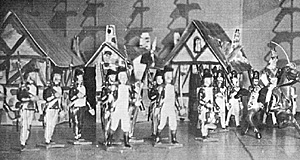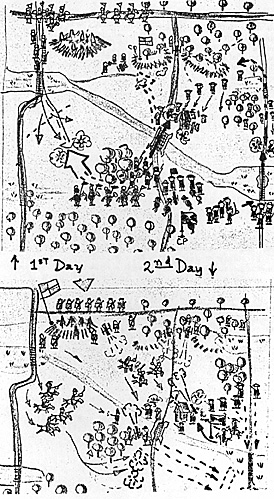
The following letter was found by a trooper of our victorius forces near the smoke-house of the Muddle Plantation. I think it bears consideration in the light of the coming counterstroke ....
"I have been appointed to a special mission and am now riding post haste with dispatches for General Magenta. I have been riding night and day to deliver them. The campaign is sweeping on and we have hopes of being in Grobnech by the end of the week if all goes well. While General Magenta has been driving from the east, winning the crossing at Houblesburg and now camped and reorganizing after the fight at BeUshears' Bridge, General Longchantz has swung in a wide arcing turning movement and is driving on the virtually unprotected capital of Grobriech.
My instructions are to meet his men at the plantation of Col. Muddle B.F.S. Retd. Once we smash the defending force to the north Grobnech cannot hold out for long.
Perhaps a few words on the affair at Bellshers bridge would interest you. As aide to General Magenta, I had the best possible opportunity for viewing the battle.
I woke as a splatter of musketry and the roar of a cannon blew the dawn to shreds. Our skirmishers had worked close to the bridge during the night in an effort to determine the extent of the enemy positons. The firing indicated that they were doing it the hard way. Our plan was a swift stroke by an assault column of picked grenadiers. They would sieze the bridgehead while a flanking column enveloped the enemy from the right. A squadron of the life guards was to cover the left flank.
You will see by the sketch our positions at dawn.
We evidently took them by surprise! The grenadiers swept across the bridge before the enemy could build up much firepower. The guncrew covering the bridge was in action must long enough to cough out a single blast of grapeshot that riddled the first company. Then they broke as a wave of bayonets washed around them. Meanwhile I could hear the screaming of the Highland pipes as Col. Haggis McHighroad, right wing commander, threw a battalion of the Black Watch at the infantry holding the ford. They fired a volley, they with wild shouts and slogan-yells they matched broadsword against bayonet in hand-to-hand combat.
Our horse artillery opened a brisk duel with an enemy battery. They covered the mopping up of the village as the retreating bluecoats fell back to a pine covered ridge in the rear. From the dust clouds it seemed as if their strongest forces must be forming on those hill tops.
By 10 o'clock the action had quieted down with the grenadiers holding the village. The captured gun was emplaced to cover the road north. McHighroad reported the crossing completed, the ford secured, and as soon as his reserves reported in he would drive due north and attempt to turn the ridgeline position.
 Shortly after noon a messenger arrived in a lather of foam and
dust with the news that a strong column, horse and foot, was crossing
Broomstraw ford on our left flank! The general ordered me to return
with the messanger, and tell Commander Wintergreen of the
"Lifesavers" to charge the column at once and drive them back across
the ford. We left at a gallop.
Shortly after noon a messenger arrived in a lather of foam and
dust with the news that a strong column, horse and foot, was crossing
Broomstraw ford on our left flank! The general ordered me to return
with the messanger, and tell Commander Wintergreen of the
"Lifesavers" to charge the column at once and drive them back across
the ford. We left at a gallop.
As we drew near, I recognized the uniform, of the 2nd Cuirassiers, the best beef trust of the Graustarkian army, they swung into line to accept our invitations as we thundered down upon them. The two waves came together with a sound like two loads of scrap iron, then broke into a dozen whirlpools of flashing swordblades.
I found myself facing an officer who had more courage than swordsmanship. I slipped through his guard on the third pass and found myself with a spare moment. Opening his saddlebags, I had the immense good fortune to find fourteen gold nobles and a flask of brandy.
Since these things seldom last long, we soon saw their backs. Aye, their backs disappearing behind a hedge of evil looking muskets with the points of bayonets winking a foot's welcome at us. Well sir, cavalry in the open is one thing and steady infantry in a square is another thing entirely. Besides, the cuirassiers were forming for another charge. Away we went. They were hot after us as we dodged around the end of the forest and our little horse guns greeted them with a well hourished fire of canister. This quite discouraged them and cooled off the action on that flank.
Hearing the drums rolling for the advance up the center, Wintergreen swung a couple of troops around the woods and as the attack surged out of the village we joined it. Right smack into a blast of the most devastating artillery fire I have yet seen. Then I saw, through the powder smoke, the green coats and bearskin crests of the gunners and recognized them for the Pffercorn artillery. These were the men who at the storming of Cauphintown, manhandled their pieces right through the breach to sweep the streets with grapeshot. It was more than we could stand and the attack fell back to the cover of the village. It was at that moment that Wintergreen broke through the lines and galloped right into the Bluvian command post. After a furious saber duel he killed the Bluvian commander, General Bluebottle, I believe. As I covered his retreat, I noticed a surge of new men from the flank and managed to drag one back with me. He proved to be one of the famed Union Brigade. With that unit on the field he gave me orders for General Longchantz. He felt sure that he could pin the Bluvian army to the field and keep them from reinforcing the defenders of Grobnech. If we can take the capitol, I forsee nothing but a speedy end to the war. I should reach the headquarters at Muddle's Acres by morning.. .
Here the manuscript ends.
NOTES AND OBSERVATIONS
The battle at Bellshears was a one hour affair played by the "Old Rules" and was one of a series of four battles which made a campaign.
For those interested, General Longchantz and his column met the enemy as they rode into Muddle's Acres. It was indeed a muddled affair and Longchantz was definitely not the equal of Magenta as a commander.
His flank column of Gurka Rifles became so entranced in making a flank march over a mountain that they were held out of the entire action by a two man patrol. The rest of the army was crumbled into small bits by staunch Bluvian defenders.
The rules of this game provide for individual firing and combats by the soldiers and since the overall numbers were small, this allows for many instances of dashing bravery. Such as Wintergreen's duel with the Bluvian commander.
The "Bluvian Spy" rule provides for this sort of game and the small bickerings, duels and hither and yond tactics can be a welcome change from the more serious sort of mass warfare used in other versions of the war game.

Back to The Armchair General Vol. 2 No. 1 Table of Contents
Back to The Armchair General List of Issues
Back to MagWeb Master Magazine List
© Copyright 1969 by Pat Condray
This article appears in MagWeb (Magazine Web) on the Internet World Wide Web. Other military history articles and gaming articles are available at http://www.magweb.com
